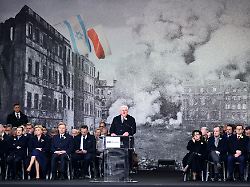Commemoration of Uprising in the Ghetto
Steinmeier feels “deep shame” in Warsaw
04/19/2023, 3:12 p.m
80 years ago, Germans committed the worst crimes in Poland’s capital. Decades later, for the first time, a head of state of the Federal Republic of Germany is allowed to take part in the commemoration of the uprising in the Warsaw ghetto against the Nazi occupiers. Steinmeier is humble.
On the 80th anniversary of the Warsaw Ghetto Uprising, Federal President Frank-Walter Steinmeier asked for forgiveness for the crimes committed by the German occupiers in World War II. “The appalling crimes that Germans have committed here fill me with deep shame,” Steinmeier said at a joint commemoration event in Warsaw with Polish President Andrzej Duda and Israeli President Isaac Herzog in front of the monument to the heroes of the ghetto. “I stand before you today and ask your forgiveness for the crimes that Germans have committed here,” said the Federal President. At the same time, it fills him “with gratitude and humility” that he is the first German head of state to be able to take part in this commemoration.
Steinmeier began his speech with the words: “Farewell, Jewish people. Never allow such a catastrophe again.” He spoke the sentences, a quote from a ghetto resident who was killed in the Treblinka extermination camp, in Yiddish. “Germans meticulously planned and carried out the Shoah’s crime against humanity,” said Steinmeier. “Germans persecuted, enslaved and murdered Europe’s Jews, the Jews of Warsaw, with unimaginable cruelty and inhumanity.” Steinmeier praised the “unimaginable courage” of the Jewish fighters who rose up against the German troops on April 19, 1943 in a hopeless situation. “They wanted to set an example: to preserve their dignity in the face of certain death. They rose up against brutal injustice, against arbitrariness, terror, and murder,” said Steinmeier. He bows “in deep mourning to the dead”.
“A miracle of reconciliation” with Poland and Israel
After the mass deportations in the summer of 1942, only around 50,000 people lived in the ghetto, in which around 450,000 Jews were once crammed together. The uprising was brutally suppressed and the ghetto burned down, only a few people survived. “We Germans are aware of our responsibility and we are aware of the task that the survivors and the dead have left us,” emphasized Steinmeier. “I acknowledge our responsibility for the crimes of the past and our responsibility for our common future.” There shouldn’t be a “line”.
With a view to Poland and Israel, Steinmeier spoke of the “miracle of reconciliation”. The people in both countries had given the Germans reconciliation despite the war crimes, “despite the crime against humanity of the Shoah”. The most important lesson from history is: “Never again!” Steinmeier said in German, Polish and Hebrew. In this context, he condemned Russia’s “criminal war of aggression” against Ukraine and emphasized: “We stand firmly on the side of Ukraine – together with Poland and other allies.”
Duda pays tribute to the “heroes”
Since the then Federal Chancellor Willy Brandt fell on his knees in December 1970, the Ghetto Memorial has also been a formative place for German-Polish reconciliation. Steinmeier met with Holocaust survivors before the memorial service. Bilateral talks with Duda and Herzog were also on the agenda. He recognized the participants in the Warsaw Ghetto Uprising as joint heroes of Israel and Poland. “For me and for many Poles, they are above all a symbol of bravery, determination and courage,” said Duda at the commemoration.
The people who rose up against the German occupiers in 1943 were “the heroes of Israel, the heroes of the Jews all over the world, they are the heroes of Poland and the Poles”. With their courage, the insurgents are a role model for Israeli and Polish soldiers who guard the borders of their countries, Duda continued.
